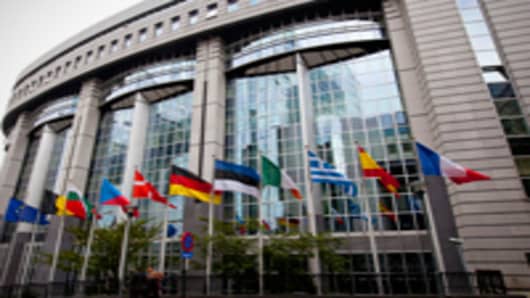European finance ministers said Portugal must make deeper budget cuts and privatize state firms in return for a bailout that could be agreed by mid-May.
Portugal bowed to pressure from financial markets and its European partners this week and became the third euro zone country after Greece and Ireland to request financial help from the European Union and the International Monetary Fund.
Finance ministers from the 17-nation single currency area met at a palace north of Budapest on Friday to discuss the sovereign debt crisis that has haunted the bloc for over a year, with Portugal the main focus of their talks.
Portuguese Prime Minister Jose Socrates resigned last month after parliament rejected a new round of budget austerity meant to help the country meet its deficit reduction targets for 2011.
He is continuing to serve in a caretaker capacity until new elections are held on June 5. The main opposition party has backed the request for aid, but negotiations on an economic adjustment program — a precondition for assistance — are likely to be tough as cross-party consensus will be needed.
"The preparations will start immediately to reach a cross-party agreement ensuring that an adjustment program can be adopted by mid-May and implemented swiftly after the formation of a new government," European finance ministers said in a statement.
They said the program would be based on three pillars: an "ambitious" fiscal adjustment to restore financial sustainability; growth and competitiveness enhancing reforms including a far-reaching privatization program; and measures to maintain the liquidity and solvency of the financial sector.
Inflexible labor laws, red tape in business administration and high wages and production costs compared to Eastern Europe and East Asia have seriously undermined Portugal's competitiveness.
The country has posted meager growth, with an average annual expansion of gross domestic product (GDP) of less than 1 percent over the past decade, according to data from the IMF and the World Bank.
Risk for Spain
Officials did their best to drive home a message that the contagion that has spread across the bloc's southern periphery would not hit Portugal's larger neighbor Spain, which has scrambled to reform its labor market, pension system and savings banks this year to avoid a similar fate.
For now markets appear to be confident Spain can avoid becoming the third euro zone domino.
The spreads between Spanish bond yields and those of German benchmarks — a key measure of investor confidence in Spain's finances — have changed little, hovering at around 1.8 percent, since Portugal announced on Wednesday it would seek aid.
The euro has also risen to a 15-month high against the dollar, reflecting confidence in the broader euro zone. The single currency has pushed higher following the European Central Bank's decision on Thursday to raise interest rates by 25 basis points — the first hike since July 2008.
European Central Bank President Jean-Claude Trichet, who also attended the meeting in Hungary, declined to comment on the euro's level, which could undermine the economies of weaker euro zone countries already struggling under huge debt piles.
Investors are continuing to scrutinize Spain's weaknesses — a banking sector hit by a burst property bubble, high unemployment and a struggle to generate growth.
"The predominant view is that this ringfences the three weaker economies in the euro area," Klaus Regling, the head of Europe's rescue fund, said of a Portuguese aid deal.
"There is a clear differentiation here. On Spanish debt, there is a real market. There is buying and selling going on. The risk of contagion is much less than six or nine months ago."
'Starting Point'
Ministers described the rejected measures unveiled by the Socrates government last month as a "starting point" for talks on a fiscal adjustment program.
European Economic and Monetary Affairs Commissioner Olli Rehn told reporters that European officials were confident Lisbon could manage the country's funding needs this month and next, but that June, when some 4.9 billion euros in bond redemptions are due, would be "more challenging."
Rehn and Regling said it would take 10 days to ensure financing once the bailout deal was in place, most likely on May 16. Lisbon will require about 80 billion euros in aid, roughly the same amount as Ireland but less than the 110 billion euro package offered to Greece nearly one year ago.
There was no agreement in Hungary on reducing the rate on Ireland's rescue loans, but the government in Dublin voiced confidence that a deal could be sealed in June.
Ministers also discussed Greece, reminding Athens of the importance of sticking to its public deficit targets amid reports it could fall short for 2010.
Speculation has grown in recent weeks that Athens may have to restructure a debt load that is expected to peak at over 150 percent of gross domestic product (GDP), with senior government officials in the euro zone conceding in private that such a step may be inevitable.
But the Greek government and leaders of other euro members have rejected that talk.


